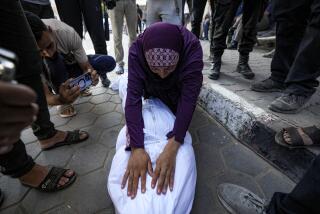Egypt Blames ‘Arab Nation,’ Palestinian Extremists in Hijack
- Share via
CAIRO — Egypt said Monday that extremist Palestinians and an “Arab country known for its terrorist actions” were responsible for the hijacking of an EgyptAir jetliner.
Deeply embarrassed by the bloody outcome, the government also sought to defend its decision to storm the jet on Malta, a move that resulted in heavy loss of life Sunday among the plane’s passengers.
Although the government’s statement about the affair did not name the country it accuses of planning the hijacking, Egyptian troops continued to deploy along the border with Libya, military sources said.
Armed Forces on Alert
The armed forces were placed on alert Sunday, and reinforcements began moving toward the western frontier after Egyptian officials said privately that Libya was believed to have been behind the hijacking.
The alert has not been officially announced, but security sources said reinforcements from Cairo and El Faiyum, southwest of the capital, were dispatched to the border where troops were on battle-ready alert. Major highways between Cairo and the border were closed to civilian traffic Sunday but reopened Monday.
Western diplomats trying to assess the situation said they do not know if the alert is merely intended as a warning to Libya or is the portent of a more serious confrontation between the two long-hostile North African states.
However, they suggested that the threat of a crisis with Libya might be useful to the government of President Hosni Mubarak as a way to deflect criticism of the Egyptian commando assault that ended the hijacking of EgyptAir Flight 648.
Justifying Actions
Egypt’s state-run press has not yet published the full extent of the casualties in that action, which the Maltese government put at 60 dead and 26 injured. However, a lengthy official statement issued Monday sought to justify the raid and shift the blame for the casualties onto the hijackers and the limited firefighting capabilities at Luqa International Airport in Valletta, the Maltese capital.
The Egyptian government’s discomfort at the outcome seemed nevertheless to be evident from the statement’s contradictory assertions.
“The terrorists were attacked in a lightning assault . . . and shot without any of the passengers being hurt,” it asserted. “However, the terrorists threw three phosphorus grenades in the front and rear of the plane, which started large fires and spread burning shrapnel. The available resources at Valletta airport to face this situation were limited and modest, and therefore the number of people saved were 44. . . .”
The statement did not mention the death toll nor the fact that most of the survivors (actually, only 37 of those aboard survived) were wounded, some critically.
It added that the raid was “successful” and ended “without any loss (of life) among the heroic commandos.”
Shock and Dismay
Privately, however, Egyptian officials expressed shock and dismay that the attempt to save the passengers’ lives should have cost so many of them.
“This is a very tragic and messy conclusion,” a Foreign Ministry official conceded. “How can you storm a plane when you know the casualties will be so high?”
Another source said he thinks there will have to be an official inquiry into the affair, especially in view of reports that the commandos, reported to have been members of an elite, U.S.-trained force, fired blindly into the cabin after bursting inside.
For the beleaguered Mubarak government, faced with a nearly bankrupt economy and growing opposition on both the left and the Islamic fundamentalist right, the Malta affair was the second humiliation in as many months.
Last month, Mubarak was deeply embarrassed by U.S. allegations that he lied about the whereabouts of the hijackers of the Italian cruise ship Achille Lauro in order to avoid detaining them.
Egypt’s pride was hurt--and Mubarak’s position was further eroded in the opinion of most observers--by the U.S. seizure of the plane flying the Achille Lauro terrorists out of Egypt. By grim coincidence, that plane was the same aircraft hijacked to Malta.
The Achille Lauro incident resulted in anti-government demonstrations on Cairo’s campuses and seriously strained Egypt’s relations with the United States.
Like ‘Keystone Cops’
This time, the sources said, Egypt needed to show that it was not soft on terrorism, as Washington’s criticism of its handling of the Achille Lauro affair implied. However, the outcome, as one analyst noted, was “less like Rambo than the Keystone Cops.”
Despite attempts to sanitize accounts of events in Malta in the Egyptian press, the outcome was already showing signs of developing into a major political controversy for Mubarak.
Wahid Raafat, vice chairman of the Wafd Party, Egypt’s largest opposition group, called the raid “a complete failure” and said that Defense Minister Abdel-Halim abu Ghazala should resign. “The results were frightening. Today should be a day of national mourning,” he said.
More to Read
Sign up for Essential California
The most important California stories and recommendations in your inbox every morning.
You may occasionally receive promotional content from the Los Angeles Times.













